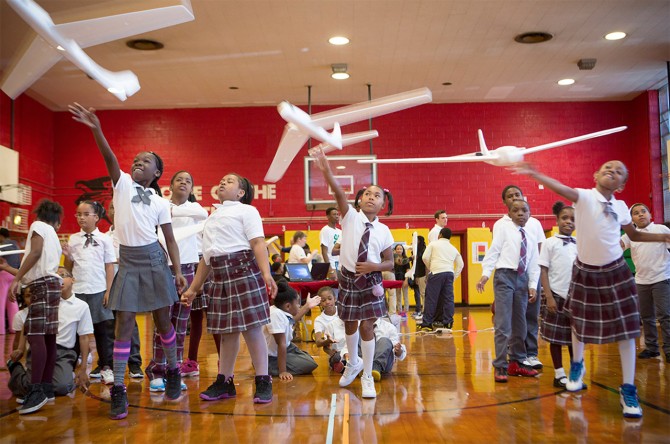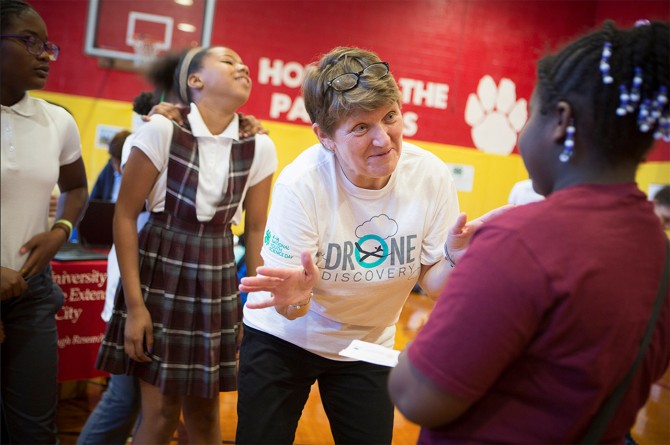A drone flies in Brooklyn; kids fascinated
By Jon Craig
A Brooklyn school gymnasium was transformed into a landing pad for drones on Oct. 7 as part of a Cornell-sponsored science discovery program.
Laughter, cheering and plenty of questions from more than 300 inner-city schoolchildren filled the air at Public School 21. Drone Discovery in New York City was a big hit, and part of a larger 4-H National Youth Science Day that involved an estimated 100,000 children across the country.
Lucinda Randolph-Benjamin, Cornell Cooperative Extension-New York City extension associate for family and 4-H youth development, kept busy rounding up and lining up students in various work stations. At one of the stations, they eagerly learned coding – to design virtual flight paths. Another gave them a chance to make gliders and hover aircraft while learning about vertical and horizontal flight maneuvers.
The most popular task of the day, however, was flying drones made of white foam and videotaping solo flights with mini-cameras.
Teachers, Cornell staff, collegiate 4-Hers and 4-H leaders and volunteers designed the drone challenge and later guided excited schoolchildren through the learning exercises.
“We get to constantly learn, too,” said Jackie Davis-Manigaulte ’72, a senior extension associate based in Manhattan.
Susan Hoskins, senior extension associate at Cornell’s Institute for Resource Information Sciences, said the children are also taught about how unmanned drones are used in many real-world applications beyond warfare, including collecting agricultural data on crops, plants and diseases; bird and other wildlife studies; in search-and-rescue operations; and inspecting underneath bridges and servicing out-of-reach utility lines.
“We continually learn from each other and together,” Hoskins said.
Davis-Manigaulte said teachers are given 4-H discovery packets so they can continue discussing and practicing what the students learned at P.S. 21 on Oct. 7.
“We want to make sure these youths get stimulated,” Hoskins said.
They’re encouraged to think differently from how they would in a traditional classroom setting, Davis-Manigaulte added, noting the exposure might get them thinking about studying different subjects or pursuing careers in research, science or aviation.
Drone Discovery and the accompanying engineering design challenges were developed by staff and faculty members in Cornell Cooperative Extension and the College of Human Ecology. In addition to solving real-world problems, students are taught about safety and regulations, remote sensing and flight control.
“We’re trying to connect these kids with bigger issues,” Hoskins said.
Jon Craig '80 is a writer based in Westchester County, New York.
Media Contact
Get Cornell news delivered right to your inbox.
Subscribe
